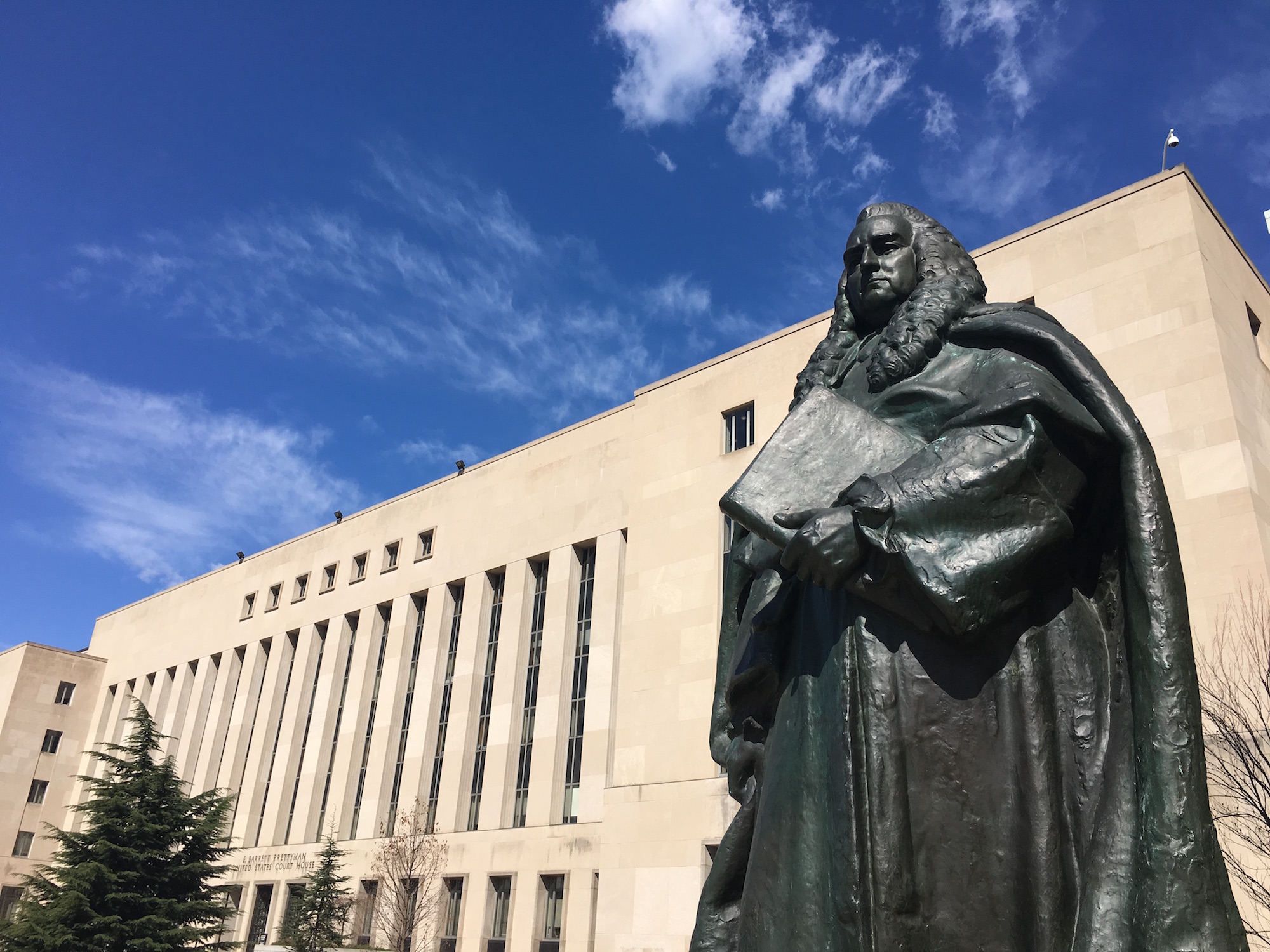
The E. Barrett Prettyman United States Courthouse houses both the federal court for the District of Columbia and the Circuit Court of Appeals for the District of Columbia Circuit. Photo by Indianz.Com (CC BY-NC-SA 4.0)
A federal judge will hold a status conference in Shawnee Tribe v. Yellen, formerly known as Shawnee Tribe v. Mnuchin, on February 17, 2021.
The hearing before Judge Amit P. Mehta takes place at 11:30am Eastern on February 17. The public can listen by dialing (877) 848-7030 and using access code 321 8747.
At issue in the case is whether the Shawnee Tribe, the Miccosukee Tribe and the Prairie Band Potawatomi Nation should receive additional COVID-19 relief from the the federal government. The D.C. Circuit Court of Appeals, in a January 7 decision, already opened the door for such payments.
In a status report filed on February 15, government attorneys said the Department of the Treasury will indeed come up with a new funding formula to address the shortfalls in payments from the Coronavirus Aid, Relief and Economic Security Act, also known as the CARES Act.
“In constructing this revised methodology, Treasury intends to re-consider the formula and/or data used to allocate the funds to plaintiffs, and similarly-situated tribes, under Title V of the CARES Act,” the status report reads.
04518330663
At the same time, the Department of Justice said Secretary Janet Yellen, who joined President Joe Biden’s administration on January 26 after being confirmed by the U.S. Senate a day prior, needs another two months to develop the “revised methodology.”
“Treasury anticipates publishing its revised methodology on or before April 30, 2021,” the status report adds.
Additionally, government attorneys said the new formula will account for litigation pending before the U.S. Supreme Court. That means the tribes that were shortchanged by the Donald Trump administration might still find themselves out of luck.
The status report notes that the pending decision in Yellen v. Confederated Tribes of the Chehalis Reservation and Alaska Native Village Corporation Association v. Confederated Tribes of the Chehalis Reservation “will impact the availability of funds for additional payments.”
In making initial payments from the CARES Act, former Secretary of the Treasury Steve Mnuchin treated some tribes as having a U.S. Census population of zero (0). As a result, the Shawnee Tribe and the Miccosukee Tribe only received $100,000 in the first round.
The Prairie Band Potawatomi Nation was also shortchanged because Mnuchin based payments not on tribal citizenship but on U.S. Census population information kept by the Department of Housing and Urban Development. Tribes had been asked to submit enrollment figures, only to see Treasury change course after a major data breach.
In total, the three tribes were shortchanged more than $21 million by the Trump administration.
With a #COVID19 debacle from the Donald Trump era still raging in the courts, Indian Country is paying close attention as the Department of the Treasury gains new leadership. #JoeBiden #KamalaHarris #Coronavirus #CARESAct #CoronavirusReliefFund https://t.co/1nDCBUxKK1
— indianz.com (@indianz) January 25, 2021
Through the CARES Act, Congress set aside $8 billion in COVID-19 relief for tribal governments. The vast majority of the Coronavirus Relief Fund (CRF) was distributed in three payments last year by Treasury.
A heated dispute over the inclusion of Alaska Native corporations in the CRF has resulted in about $534 million being set aside. The fate of that leftover funding is pending before the Supreme Court, which has not yet scheduled arguments in Yellen v. Confederated Tribes of the Chehalis Reservation and Alaska Native Village Corporation Association v. Confederated Tribes of the Chehalis Reservation .
The hearing before Judge Amit P. Mehta takes place at 11:30am Eastern on February 17. The public can listen by dialing (877) 848-7030 and using access code 321 8747.
